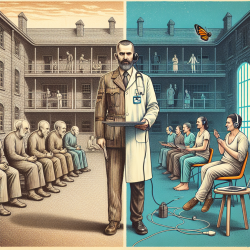Understanding the Impact of Childhood Maltreatment on Binge Eating and Drinking
As practitioners in the field of therapy, it is crucial to understand the underlying factors that contribute to binge eating and drinking behaviors, particularly among emerging adult women. A recent study titled "Associations of childhood maltreatment with binge eating and binge drinking in emerging adult women" sheds light on how adverse childhood experiences (ACEs) can significantly influence these behaviors.
The Research Findings
The study conducted by Friedman et al. (2023) examined a diverse group of women aged 18-30 and found that over half of the participants reported at least one ACE. The research identified physical and emotional abuse as the most significant predictors of binge behaviors. Specifically:
- Physical abuse was strongly associated with a higher likelihood of binge drinking and the co-occurrence of binge eating and drinking.
- Emotional abuse was uniquely predictive of binge eating alone.
These findings highlight the importance of considering the specific types of childhood maltreatment when assessing and treating binge behaviors in young women.
Implications for Practitioners
For practitioners, these insights can be instrumental in improving therapeutic approaches. Here are some ways to incorporate these findings into practice:
- Trauma-Informed Care: Implement trauma-informed care strategies that recognize the impact of childhood abuse on current behaviors. This involves creating a safe environment and fostering a sense of empowerment for clients.
- Screening for ACEs: Regularly screen for ACEs during assessments to better understand the root causes of binge behaviors. This can guide more personalized treatment plans.
- Focus on Emotional Regulation: Develop interventions that enhance emotional regulation skills, as difficulties in this area are often linked to both binge eating and drinking.
- Collaborative Approach: Work collaboratively with clients to identify coping mechanisms and support systems that can mitigate the effects of past trauma.
Encouraging Further Research
While this study provides valuable insights, it also opens the door for further research. Practitioners are encouraged to explore additional questions such as:
- How do different combinations of ACEs affect binge behaviors?
- What role do socioeconomic and cultural factors play in the development of these behaviors?
- How can early intervention strategies be optimized to prevent the onset of binge behaviors in at-risk populations?
By engaging in further research, practitioners can contribute to a more comprehensive understanding of these complex issues and improve outcomes for their clients.
To read the original research paper, please follow this link: Associations of childhood maltreatment with binge eating and binge drinking in emerging adult women.










